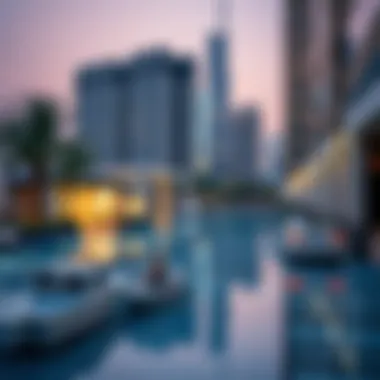Dubai Expenditure Analysis: Economic Insights Unpacked


Intro
Dubai stands at the crossroads of tradition and modernity, its economic landscape shaped significantly by various expenditure dynamics. This city, known globally for its bustling markets, luxury properties, and stunning architecture, also boasts a complex web of financial activities that drive its growth. Understanding the nuances of these expenditures is crucial, especially for investors and home buyers considering entering this thriving market.
In this article, we will delve into the key sectors that contribute to Dubai's economy, including government spending, private sector investments, and tourism revenues. Each of these elements plays a pivotal role in influencing the real estate market, which increasingly attracts local and international investors.
Fasten your seatbelts as we navigate through the intricate relationship between expenditure patterns and real estate dynamics in Dubai. We aim to provide a comprehensive look at how economic spending shapes the market's landscape, offering valuable insights for a discerning audience keen on capitalizing in Dubai's property arena.
Understanding the Economic Landscape of Dubai
The examination of Dubai's economic landscape is crucial for unearthing the various currents that drive the city's growth and transformation. It encapsulates an intricate web of factors including government spending, private sector dynamics, and the influence of tourism. To appreciate how these elements inform the larger picture, one must grasp their interconnected nature.
In essence, understanding the economic landscape aids not only investors but also home buyers, real estate agents, and property managers to make informed decisions. Recognizing trends in GDP, employment rates, and sector performance can be the difference between scrambling to catch up and surfing the waves of opportunity.
Historical Overview
Dubai's economic journey has been nothing short of astounding. From its modest beginnings as a fishing village to becoming a bustling commercial hub, the city has undergone significant metamorphoses. The discovery of oil in the 1960s served as the catalyst for rapid development. With newfound wealth, Dubai began investing in infrastructure to attract global businesses. This transformation laid the groundwork for the economic model that we see today, one that emphasizes diversification beyond oil.
Notably, the Sheikh Mohammed bin Rashid Al Maktoum’s vision of fostering tourism and real estate has driven strategic shifts. The establishment of the Dubai Free Zone, along with initiatives to host events like the Dubai Shopping Festival, have enhanced both the local economy and the global perception of the city as a business-friendly environment. These historical choices set in motion the current dynamics of expenditure that we will explore further in this article.
Current Economic Indicators
Now, let's turn our focus to the present. Current economic indicators reveal both the strengths and challenges facing Dubai’s economy. The city's GDP growth has shown resilience even amid global economic fluctuations. Key sectors such as tourism, real estate, and finance continue to evolve, reflecting a concerted effort to harness resources and adapt to changing market demands.
Key economic indicators include:
- GDP Growth Rate: Stands at around 3.5%, indicative of sustained growth momentum.
- Unemployment Rate: Dips below 5%, demonstrating a robust job market.
- Inflation Rate: Tamed at approximately 1.3%, which is helpful for prospective buyers and renters alike.
Moreover, the robust influx of foreign direct investment points towards renewed investor confidence. These indicators not only reflect health in the economy but also help shape expectations around government expenditure and its potential impact on sectors like real estate.
"Economic dynamics in Dubai are not just numbers; they’re the pulse of a city that adapts and innovates in real-time."
In addition to these statistics, one must consider the real-time data that contributes to understanding consumer behavior and spending. All these factors converge to provide a comprehensive picture of Dubai’s economic efficiency and sustainability.
In summary, grasping the economic landscape is invaluable for stakeholders at all levels. Connecting historical momentum with current indicators paves the way for insightful predictions and strategic planning.
Government Expenditure in Dubai
Government expenditure in Dubai plays a crucial role in the overall economic framework of the city. It acts as a catalyst for growth, influencing various sectors and supporting initiatives that benefit both residents and investors. In a rapidly evolving urban landscape, understanding how the government allocates its budget provides insights into the future development of the emirate. This scrutiny is not merely academic; it highlights priorities that could shape the economic environment in which investors and home buyers operate.
Public Sector Investments
Public sector investments in Dubai are significant, with funds directed towards a range of projects aimed at enhancing the quality of life for citizens and expats alike. These investments often target sectors like education, healthcare, and public safety, contributing to a well-rounded living experience. For instance, substantial allocations for educational institutions have been made, paving the way for a skilled workforce, which in turn attracts businesses looking to set up shop in the emirate.
Additionally, the government's commitment to innovation fosters an environment where new ventures can thrive. This blend of necessary social projects and fostering entrepreneurship positively influences the real estate market. Properties in areas that are set for public development often see an increase in demand, thereby appealing to investors.
Infrastructure Development
Infrastructure development is the backbone of Dubai's government expenditure strategy. The government is known for its ambitious projects aimed at improving transport, utilities, and general connectivity. The expansion of the Dubai Metro, for instance, has connected traditionally under-served regions to the bustling heart of the city, enhancing access to employment and lifestyle options.
Moreover, projects like the Dubai Expo 2020 site have stimulated both local and international investments, creating ripple effects across various sectors. Such developments aren't without challenges, but the potential benefits are immense. Well-planned infrastructure reduces congestion, boosts tourism, and increases property values. Therefore, both investors and renters should keep a keen eye on infrastructural expenditures as they directly influence market dynamics and community appeal.
Social Services Funding
Funding for social services is another pivotal aspect of government expenditure that affects Dubai's overall economic dynamics. The government allocates substantial resources to healthcare, public housing, and welfare programs, primarily focusing on improving the living standards of its diverse population. A public health system that is both efficient and accessible attracts expatriates and their families, making Dubai an attractive place to live and work.
The social fabric of the city is constantly evolving, and with that, the demand for social services grows. Expenditures here can lead to improvements in living conditions, which invariably affect the real estate market. Homes in neighborhoods that feature strong social support systems often see higher demand and property values due to their appeal to families needing a stable environment.


Private Sector Contributions
The contribution of the private sector to Dubai's economy cannot be overstated. This sector not only complements government expenditure but also stimulates growth through innovation, employment, and investment opportunities. With a booming economy, Dubai shows a favorable environment for private enterprise, allowing businesses to thrive and effectively respond to market demands.
Businesses in Dubai have a variety of avenues to invest. They range from hospitality and retail to technology and real estate. Notably, the confluence of corporate investment and foreign direct investment (FDI) intertwines to create a robust economic fabric, driving both job creation and consumer spending.
Corporate Investment Dynamics
Corporate investment in Dubai is characterized by its dynamic nature. High-profile companies from around the world are increasingly looking to establish their presence in this global hub. Many multinational corporations have set up their regional offices in Dubai, drawn by its strategic location and business-friendly policies.
The areas attracting significant corporate investment include tech startups, logistics, and, quite prominently, the real estate market. The recent initiatives by the government to ease regulations have opened doors for new ventures, providing businesses with the flexibility they require to flourish.
Moreover, Dubai's economic model promotes partnerships and joint ventures between local and foreign companies. This not only enhances technological transfer but also boosts local capabilities. Companies such as Emirates Airlines and Emaar Properties serve as prime examples of how corporate investments can lead to international expansion and increased brand recognition, catalyzing further investments.
"In Dubai, the future isn’t just a possibility; it’s a crafted outcome shaped by deliberate investments in diverse sectors."
Impact of Foreign Direct Investment
Foreign direct investment plays a pivotal role in Dubai's economic dynamics. The city has implemented several frameworks to attract FDI, which include free zones offering various incentives such as 100% foreign ownership and tax exemptions. These incentives make it a magnet for global investors looking for stable markets. Consequently, Dubai has transformed into one of the top FDI destinations globally.
The influx of FDI impacts numerous sectors, including real estate, hospitality, and technology. In real estate, for example, foreign investors are purchasing significant amounts of property, fueling not only construction but also increasing overall market value.
Moreover, the presence of foreign companies results in job creation, indirectly improving the quality of life for residents. The growing expatriate population leads to enhanced demand for services, from retail to education, thus positively affecting the economy. The government's commitment to diversifying the economy underscores the essential nature of FDI in fostering growth.
Final Thoughts
In summary, the private sector is an indispensable engine of economic growth in Dubai. Corporate investments and foreign direct investments come together to create a multifaceted economic landscape. Understanding these contributions is crucial for investors and stakeholders aiming to navigate the ever-evolving market of this vibrant city. The clear interdependence between these elements yields critical insights into future opportunities for investment and expansion.
Dubai's Tourism-Driven Expenditure
Tourism plays a monumental role in Dubai’s economy, acting as a significant driver behind the city's overall expenditure. With its luxury hotels, bustling shopping areas, and stunning architecture, Dubai has set itself apart as a global tourism hotspot. The revenue generated from tourism influences various sectors, most notably real estate. Understanding the dynamics of tourism expenditure in this emirate is crucial not only for investors and stakeholders but also for those living and renting in the city.
The intricate relationship between tourism revenue and economic activity manifests itself through increased consumer spending, infrastructure development, and job creation. Thus, it positions tourism at the heart of economic discussions and plans worth deep exploration. The UAE Vision 2021 strategy highlights ambitions to boost tourism's contribution to the economy, emphasizing its central role in shaping Dubai’s developmental trajectory.
Revenue Generated from Tourism
The revenue from tourism in Dubai is nothing short of impressive. In recent years, the emirate has seen millions of visitors flocking to its attractions, contributing billions to the local economy. By 2019, for instance, tourism accounted for approximately 11.5% of Dubai’s GDP, showcasing its economic significance.
Key factors contributing to this lucrative stream include:
- Diverse Attractions: From the luxurious Burj Khalifa to the mesmerizing Dubai Mall, the range of experiences attracts tourists from around the globe. Unique events such as the Dubai Shopping Festival and art exhibitions further entice visitors, generating substantial income.
- Government Initiatives: The Dubai government’s efforts to promote its tourism sector include easing visa requirements and investing heavily in infrastructure. Such initiatives have made it simpler and more appealing for international tourists to visit.
- High Spending Power: Tourists in Dubai exhibit a tendency to spend generously on accommodation, dining, and entertainment, adding to the overall revenue generated from this sector.
Tourism's contribution cascades through multiple layers of the economy, reinforcing sectors such as hospitality, retail, and beyond. Such economic multifacetedness calls for careful analysis of how changes in tourism can ripple through Dubai’s financial landscape.
Tourism's Impact on Real Estate
The relationship between tourism and real estate in Dubai is symbiotic and robust. As the number of visitors increases, so does the demand for residential and commercial properties, particularly in tourist-centric locations. This demand not only influences rental prices but also property valuations.
Several key insights highlight the impact of tourism on real estate:
- Increased Property Demand: High tourist footfall propels the need for short-term rentals and accommodations, driving property owners to furnish and lease out their units. Areas such as Dubai Marina and Downtown Dubai are particularly sought after, benefiting from both short-term vacation rentals and long-term leases.
- Real Estate Investment: Investors often eye real estate opportunities driven by tourism growth. Increased property values made possible through continuous demand can yield lucrative returns, appealing to both seasoned investors and newcomers to the market.
- Commercial Developments: With a booming tourist economy, there's a significant uptick in commercial real estate developments such as hotels, retail spaces, and attractions. These projects not only meet tourist needs but also provide jobs and stimulate the local economy.
The intersection of tourism and real estate exemplifies the vibrant, ever-evolving economic tapestry of Dubai.
Analyzing tourism-driven expenditure not only illustrates how critical this sector is to Dubai but also how it lays the groundwork for future economic strategies. A deeper comprehension of these factors assists investors, home buyers, and renters alike as they navigate the real estate landscape in a city that never sleeps.
For a more detailed understanding, exploring resources like Wikipedia or local government tourism reports can provide significant insights into Dubai’s tourism dynamics.


Real Estate Market Analysis
Analyzing the real estate market in Dubai provides crucial insights into the broader economic climate of the city. As a major player in both regional and global markets, the real estate sector is not merely a reflection of current trends, but a key driver of economic growth. With a diverse range of properties, from luxurious villas to commercial skyscrapers, understanding property dynamics is essential for investors, home buyers, and property managers alike.
The importance of thorough real estate market analysis lies in its capacity to unveil patterns that inform better decision making. Knowing how property valuation trends evolve can guide investment choices. Additionally, discerning the differences in potential returns between residential and commercial properties allows stakeholders to optimize their portfolios accordingly.
Through this analysis, we can comprehend how the influx of foreign investments, alongside local demand, continues to shape Dubai's skyline. The emphasis on sustainability and smart city developments further cements the real estate sector’s significance in the city’s overall expenditure landscape.
Understanding Property Valuation Trends
Property valuations in Dubai are influenced by a multitude of factors, including location, demand, and global economic conditions. Part of what makes Dubai's real estate market unique is its rapid evolution, which often defies traditional valuation metrics. For instance, areas such as Downtown Dubai and the Palm Jumeirah have consistently shown high property values due to their prestigious locations and luxury amenities.
In recent years, several trends emerged in property valuation:
- Proximity to Key Infrastructure: Properties near the metro, airports, and major highways tend to command higher prices.
- Regulatory Environment: Changes in laws governing foreign ownership have opened new avenues for investment, impacting property values positively.
- Market Sentiment: Events such as Expo 2020 have led to increased global attention on Dubai, affecting valuation trends.
Understanding these trends allows investors to forecast potential growth areas and make informed decisions. It also helps buyers assess whether they are paying a fair price.
"Navigating the complex property valuation landscape requires a sharp eye and an awareness of shifting dynamics."
Investment Opportunities in Residential vs. Commercial Property
When contemplating investments in property, one must weigh the benefits and limitations of residential against commercial properties. Each segment offers unique opportunities and challenges that can dictate the overall investment strategy.
In the residential sector, increasing demand for affordable housing is driving growth. Key neighborhoods, especially those that appeal to families and expatriates, present substantial opportunities. On the other hand, high-end residential properties maintain their appeal to affluent investors looking for luxury returns.
Conversely, commercial property investments represent a distinct avenue for revenue generation. With Dubai emerging as a global business hub, demand for office spaces, retail locations, and warehouses is robust. Key considerations in this realm include:
- Lease Stability: Long-term leases with corporate tenants can provide steady revenue streams.
- Economic Conditions: Flexibility to pivot between retail, office spaces, or mixed-use developments based on market conditions.
Ultimately, a balanced investment strategy often includes both segments, depending on individual risk tolerance, time horizon, and investment objectives.
This analysis of the Dubai real estate market reflects the underlying economic dynamics, demonstrating how expenditures in property translate into tangible opportunities for stakeholders.
Impact of Expenditures on Living Standards
Understanding how expenditures impact living standards in Dubai provides key insights into the well-being of its residents and the overall economic health of the city. Both governmental and private expenditures contribute to various socioeconomic elements that affect day-to-day life. These aspects range from the availability of social services to the quantity and quality of public amenities.
When thinking about the importance of expenditures, one can see how government initiatives can transform neighborhoods, enhance job opportunities, and improve educational facilities. Investments in health care and education directly affect quality of life and often reflect the priorities of local administration. Moreover, these expenditures serve as a bedrock for attracting talent and entrepreneurship, creating a vibrant community where people want to live and work.
Quality of Life Considerations
In Dubai, the term "quality of life" is often associated with several factors including safety, health care, leisure options, and environmental quality. The expenditures allocated by the government towards public health and safety directly correlate with the sense of security felt by residents. For instance, improvements in emergency medical services and public health awareness campaigns have shown positive outcomes.
Furthermore, with public parks, recreational facilities, and cultural programs funded adequately, residents enjoy a plethora of leisure options that enrich their daily lives. Here are some key considerations affecting quality of life in Dubai:
- Health services: Enhanced hospitals and healthcare services lead to longer life expectancy.
- Public Safety: Well-funded police and fire departments ensure safety and quick responses to emergencies.
- Cultural diversity: Investment in community centers fosters inclusivity and cultural appreciation, making for a richer social fabric.
These factors combine to create a holistic living experience that is attractive to both nationals and expatriates alike.
Cost of Living Analysis
The cost of living is a crucial aspect when analyzing living standards, and it is profoundly influenced by expenditure patterns. It encompasses housing, food, transportation, and personal care—elements that are foundational for any resident.
In Dubai, high demand for housing often drives prices up, but the government’s expenditure on social housing projects aims to alleviate some of that pressure, ensuring that various income groups can find a place to live without breaking the bank. Here’s how different expenditure areas impact the cost of living:
- Housing Supply: Investments in new housing developments can stabilize or even lower rent prices by increasing availability, especially in high-demand areas.
- Public Transport: Efficient public transport decreases the reliance on personal vehicles, which in turn reduces overall transportation costs for residents.
- Tax Policies: Special economic zones with tax incentives can lower the cost of goods and services, positively impacting consumer expenses.


By considering these factors, potential investors, home buyers, and renters can better understand the nuances influencing their financial responsibilities in Dubai.
Ultimately, the balance between government spending and private sector growth plays a substantial role in shaping a livable urban environment, providing a comprehensive lens through which to view Dubai’s future economic dynamics.
Future Trends in Dubai Expenditure
Understanding future trends in Dubai's expenditure is vital for anyone involved in the economic ecosystem of the city. The interplay of several factors—including government policies, market demands, and global economic conditions—shapes how spending will evolve in the next few years. With Dubai being a hub for finance, trade, and tourism, identifying these trends can illuminate the path forward for investors, home buyers, and stakeholders within the real estate sector. The insights garnered from this exploration will not only help highlight possible opportunities but may also prepare one for upcoming challenges.
Predicted Economic Shifts
Predictions about economic shifts typically revolve around both external and internal factors. First, we observe a continued reliance on diversification strategies adopted by the UAE. With oil prices often fluctuating, there’s a growing push towards alternative sectors, such as technology and tourism. For instance, Dubai is heavily investing in digital technology and innovation. The Smart Dubai initiative aims to create a city governed by data and advanced technology, which enhances overall efficiency in both public and private services.
Moreover, there’s an expected increase in public spending towards infrastructure projects that align with this vision, such as the ongoing projects surrounding the 2020 World Expo, although delayed due to the global pandemic. The investments expected during and following this event will significantly influence property values and market demand.
Some key predicted shifts include:
- Continued Infrastructure Growth: Enhancements in transport networks, telecommunications, and public services to support an expanding demographic.
- Emerging Economic Sectors: Investment in healthcare and education as well as the tech sector will bolster job creation and land demand.
- Sustainable Practices: Increasing emphasis on green technology and sustainability in construction, which influences expenditure patterns.
"As the world evolves, so too must our approach to investment and expenditure; Dubai stands as a testament to this necessity."
Innovations Driving Future Investments
The allure of Dubai for foreign investors isn’t merely a stroke of luck; it’s crafted by a purposeful approach to innovation in various economic sectors. The government embraces cutting-edge technologies to foster growth and attract global talent. One significant avenue is through the incorporation of Artificial Intelligence (AI) and Smart City technology, which optimizes everything from traffic management to energy consumption.
Moreover, blockchain technology is gaining traction in real estate transactions, ensuring transparency and speed, attracting those wary of traditional methods. How this innovation transforms property dealings directly affects investment patterns—encouraging international investors who seek reliable and efficient methods of engaging in real estate ventures.
Innovation can be further dissected into:
- Digital Real Estate Platforms: Making property transactions more accessible and transparent.
- Green Building Technology: Attracting environmentally-conscious investors aiming to fund sustainable developments.
- Experience-Based Investing: More focus on developments that provide lifestyle experiences—think integrated living and entertainment complexes.
Future trends in expenditure in Dubai not only promise a dynamic shift in economic landscapes but also present a myriad of opportunities for various stakeholders—the key is staying ahead of the curve and adapting to these changes.
Ending: The Interconnection of Expenditure and Real Estate
Understanding the link between expenditure and real estate in Dubai isn't just a matter of numbers. It's fundamentally about how resource allocation can influence the very fabric of the city's living and investment climate. With government investments in public services and the private sector's role in shaping diverse property offerings, each element intertwines in creating a vibrant and appealing environment for both residents and investors.
The evolution of spending patterns reflects broader economic strategies. For one, governmental efforts in infrastructure and social services significantly enhance the quality of life. This, in turn, becomes a pivotal attraction for prospective residents and businesses. When people can visualize their future amidst well-developed amenities, the area's desirability skyrockets. It’s like throwing a pebble into a pond; the ripples spread outward, impacting the real estate sector profoundly.
The dynamic interplay between tourism expenditure and real estate is also noteworthy. Revenue generated from tourists doesn’t just line the city's coffers; it fuels a thriving property market characterized by both new developments and an influx of investors looking to capitalize on growing demand. Consequently, this enhances property values, making it a hotbed for those looking to dive into the real estate scene.
To sum it up, grasping the complex relationship between expenditure and the real estate market in Dubai is not just a theoretical exercise. It's about acknowledging how strategic spending today sets the stage for tomorrow's growth in property investment opportunities. The threads of government funding, private sector involvement, and tourism revenues weave a rich tapestry that ensures the Dubai real estate market remains an attractive venture.
Summarizing Key Insights
Investment trends in Dubai reveal some critical takeaways:
- Government spending is crucial in developing infrastructure.
- The private sector plays an indispensable role in diversifying investment options.
- Tourism expenditure significantly elevates real estate demand, driving property prices higher.
- A thriving economy fosters better living conditions, making areas more appealing to prospective homeowners and renters.
In dissecting these relationships, investors can better identify strategic opportunities and gauge potential risks. What emerges is a comprehensive view of how interconnected these elements are.
Implications for Investors and Renters
The synthesis of data around Dubai's expenditure paves the way for several implications:
- For Investors: A strong understanding of government expenditure trends can guide investment strategies, signaling which areas are likely to flourish.
- For Home Buyers: Recognizing the impact of social services funding on community quality can help buyers make informed decisions about where to settle.
- For Renters: Areas with noticeable improvements in infrastructure and services indicate rising property demands, suggesting that moving into these neighborhoods could benefit renters looking for stability and growth in their living conditions.
By remaining aware of these implications, stakeholders can navigate the market more adeptly, whether they aim to invest, buy, or rent. The interplay between expenditure and real estate remains a key indicator of Dubai's economic health, making it essential knowledge for anyone involved in this vibrant market.
"In Dubai, understanding the finances behind real estate is akin to holding a compass in a vast desert; it guides decisions and predicts potential paths forward."
For further reading on the economic landscape of Dubai and investment opportunities, you may explore resources at Britannica, or for current government initiatives and infrastructure projects refer to *.gov.
Real estate investors and renters should consider joining engaged communities on platforms like Reddit for discussions surrounding trends and developments.
Embracing the evolution of expenditure will not only inform but also nurture strategic decisions in the bustling realm of Dubai real estate.











